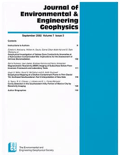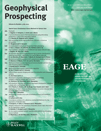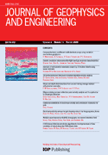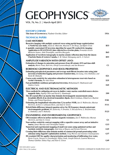
JOURNAL OF ENVIRONMENTAL AND ENGINEERING GEOPHYSICS
Scope & Guideline
Pioneering Research in Environmental Engineering and Geophysics
Introduction
Aims and Scopes
- Geophysical Methodologies:
The journal covers a wide range of geophysical methods, including seismic, electrical, electromagnetic, and ground-penetrating radar techniques, aimed at subsurface characterization and monitoring. - Environmental Applications:
Research in the journal often addresses environmental issues such as groundwater evaluation, contamination detection, and waste management through geophysical investigations. - Engineering Geophysics:
There is a strong focus on engineering applications, including site characterization for construction, assessing geological hazards, and monitoring infrastructure stability. - Data Processing and Inversion Techniques:
The journal emphasizes the development of advanced data processing methods and inversion techniques, including machine learning approaches, to improve the interpretation of geophysical data. - Interdisciplinary Approaches:
It promotes interdisciplinary research that combines geophysics with other fields such as hydrology, geology, and environmental science, enhancing the understanding of complex subsurface processes.
Trending and Emerging
- Artificial Intelligence and Machine Learning:
Recent publications increasingly feature the application of AI and machine learning for data processing and interpretation, indicating a trend towards leveraging computational techniques for enhanced geophysical analysis. - Integrated Geophysical Surveys:
There is a growing focus on integrated multi-method approaches that combine various geophysical techniques for comprehensive subsurface assessments, reflecting a trend towards more holistic investigations. - Environmental Monitoring and Sustainability:
Research addressing environmental monitoring, such as groundwater management and contamination studies, is on the rise, showcasing the journal's commitment to sustainable practices and environmental stewardship. - Advanced Inversion Techniques:
The journal is increasingly publishing studies on advanced inversion techniques, including machine learning-based methods, which are crucial for improving the accuracy of geophysical data interpretation. - Geophysical Applications in Renewable Energy:
Emerging themes include the application of geophysical methods in renewable energy contexts, such as geothermal energy exploration and site assessment, highlighting the relevance of geophysics in sustainable energy solutions.
Declining or Waning
- Traditional Geophysical Methods:
There has been a noticeable decline in the publication of studies solely focused on traditional geophysical methods without integration of modern techniques or advancements, indicating a shift towards more innovative approaches. - Low-Resolution Techniques:
Research employing lower-resolution geophysical techniques for subsurface investigations is becoming less common, as the field moves towards high-resolution and more accurate methodologies. - Generalized Case Studies:
The frequency of generalized case studies without specific applications or innovative methodologies is decreasing, as the journal favors more targeted and application-driven research. - Static Analysis Approaches:
There is a waning interest in static or one-time analysis approaches, with more emphasis being placed on time-lapse and dynamic monitoring techniques to capture changes over time.
Similar Journals

GEOPHYSICAL PROSPECTING
Illuminating the Path of Geophysical Discovery Since 1953GEOPHYSICAL PROSPECTING is a premier journal published by Wiley, dedicated to the fields of geophysics and geochemistry. With an impressive impact factor, it holds a notable place in academic circles, boasting a ranking of Q1 in Geophysics and Q2 in Geochemistry and Petrology for 2023. The journal, ISSN 0016-8025 and E-ISSN 1365-2478, features cutting-edge research addressing key challenges in understanding the Earth's structure and processes. It has been an influential platform since its inception in 1953 and continues to converge towards its goal of disseminating integral geophysical advancements through 2024. Although not open access, researchers can benefit from its wealth of high-quality articles, substantiated by commendable rankings of 41st in Geophysics and 53rd in Geochemistry and Petrology. From its headquarters in the United Kingdom, GEOPHYSICAL PROSPECTING not only contributes to the theoretical advancement of these fields but also aids practical applications in environmental exploration and resource management, making it an essential resource for researchers, students, and professionals alike.

Journal of Geophysics and Engineering
Advancing Geophysical Insights for Engineering ExcellenceJournal of Geophysics and Engineering, published by Oxford University Press, stands as a pivotal platform for the dissemination of innovative research in the interdisciplinary fields of geology, geophysics, and engineering. Since its inception in 2004, this Open Access journal has focused on advancing the understanding of geophysical phenomena and their applications in engineering, receiving a commendable Q2 ranking in multiple categories for 2023, including Geology and Geophysics. With an impressive Scopus ranking reflecting its influence—such as a 143rd position in Earth and Planetary Sciences: Geology—this journal is essential for researchers, professionals, and students seeking to engage with cutting-edge advancements and policy discussions in these critical areas. The journal’s commitment to fostering knowledge and collaboration within the global scientific community positions it as a must-read for those dedicated to furthering geophysical and engineering sciences.

Geophysics
Fostering Excellence in Earth Science ScholarshipGeophysics, published by the SOC EXPLORATION GEOPHYSICISTS - SEG, is a prestigious journal notable for its significant contributions to the fields of geophysics, geochemistry, and petrology. Since its inception in 1936, this journal has consistently provided a platform for high-quality research, maintaining a strong impact within the academic community, evidenced by its Q1 ranking in these important scientific categories for 2023. With an ISSN of 0016-8033 and an e-ISSN of 1942-2156, it features rigorous peer-reviewed articles that address the latest advancements in geophysics and related disciplines, contributing to a deeper understanding of Earth processes. Although it does not offer open access options, the journal ensures broad dissemination of knowledge and remains essential for researchers, professionals, and students dedicated to exploring energy resources and geophysical phenomena. Its Scopus rankings, including a commendable 22nd out of 165 in Earth and Planetary Sciences for Geophysics, affirm its importance and reach in the academic community. In addition to fostering scholarly discourse, Geophysics plays a critical role in advancing the practical applications of geophysical research, making it a vital resource for those engaged in exploration and environmental studies.

Swiss Journal of Geosciences
Fostering Interdisciplinary Insights in GeosciencesSwiss Journal of Geosciences is a prestigious academic journal dedicated to advancing the field of geosciences, published by SPRINGER INTERNATIONAL PUBLISHING AG. Since its inception in 2007, the journal has established itself as a leading platform for disseminating high-quality research findings in various domains related to Earth and planetary sciences, achieving a notable Q1 ranking in Geology as of 2023. With a solid reputation reflected in its Scopus ranking of Rank #72/321, the journal stands in the 77th percentile within its category. Based in Switzerland, the Swiss Journal of Geosciences embraces an open access model, making it easier for researchers, professionals, and students worldwide to access vital geological research without barriers. The journal’s objectives include promoting interdisciplinary research and fostering insights that address both fundamental and applied geoscientific problems, ensuring it remains a crucial resource for those seeking to understand our planet’s dynamics. Engage with pioneering research and contribute to the vibrant community of geoscientists by exploring the impactful articles published within its pages.

GEOCHEMISTRY GEOPHYSICS GEOSYSTEMS
Pioneering Research for a Deeper Understanding of Earth's ProcessesGEOCHEMISTRY GEOPHYSICS GEOSYSTEMS, published by the American Geophysical Union, is a leading open-access journal that has been at the forefront of advancing our understanding of earth sciences since its inception in 2000. With an impressive open access policy established in 2022, the journal promotes the wide dissemination of high-quality research in the fields of Geochemistry and Geophysics. Boasting a Q1 ranking in both Geochemistry and Petrology, as well as Geophysics, in the 2023 Journal Rankings, it is recognized among the top journals in its categories, positioning itself at the cutting edge of scientific inquiry. The journal has also secured notable rankings in Scopus, placing it in the 83rd percentile for Geophysics and the 71st percentile for Geochemistry and Petrology, reflecting its impact and relevance within the scientific community. Located in Washington, DC, GEOCHEMISTRY GEOPHYSICS GEOSYSTEMS serves as a vital resource for researchers, professionals, and students dedicated to the exploration of the complex interactions of geochemical and geophysical processes.

IEEE Geoscience and Remote Sensing Letters
Illuminating the Path of Geoscience InnovationIEEE Geoscience and Remote Sensing Letters is a distinguished journal published by the IEEE-INST ELECTRICAL ELECTRONICS ENGINEERS INC, focusing on the cutting-edge realms of geoscience and remote sensing. Since its inception in 2004, the journal has maintained a significant role within its field, achieving a robust impact factor that places it in the Q1 category for both Electrical and Electronic Engineering and Geotechnical Engineering and Engineering Geology, reflecting its high-quality research output and influence. The journal is highly ranked in Scopus, securing the 35th position in Earth and Planetary Sciences and the 154th position in Engineering, showcasing its broad academic reach and engagement with current advancements in technology and earth sciences. Although the journal is not open access, it remains accessible to a wide readership, fostering an environment for innovation and knowledge sharing among researchers, professionals, and students interested in remote sensing technologies and geosciences. With its objective to publish concise articles that present significant results and advancements, IEEE Geoscience and Remote Sensing Letters continues to be a vital resource for anyone engaged in these dynamic fields.

Riset Geologi dan Pertambangan
Empowering sustainable practices through innovative geological insights.Riset Geologi dan Pertambangan is an esteemed open-access journal published by the Indonesian Institute of Sciences, R&D Centre Biology, dedicated to advancing research in the fields of geology and mining. With an ISSN of 0125-9849 and an E-ISSN of 2354-6638, this journal has been fostering the dissemination of knowledge since 2005, ensuring that critical findings are accessible to a global audience. The journal serves as an important platform for researchers, professionals, and students to share innovative research, methodologies, and case studies that contribute to sustainable mining practices and geological advancements. By promoting interdisciplinary collaboration and the latest developments in the field, Riset Geologi dan Pertambangan plays a vital role in shaping the future of geology and mining research, particularly within the Southeast Asian context.

Geofizicheskiy Zhurnal-Geophysical Journal
Unlocking the Secrets of Geophysical ResearchGeofizicheskiy Zhurnal-Geophysical Journal, published by the esteemed S I Subbotin Institute of Geophysics, National Academy of Sciences of Ukraine, stands as a vital resource for professionals and researchers in the field of geophysics. With an ISSN of 0203-3100 and an E-ISSN of 2524-1052, this journal is recognized for its rigorous peer-reviewed articles that delve into various aspects of geophysical research, including seismic studies, geodynamics, and Earth surface processes. Although currently not under an open access model, the journal maintains a commitment to disseminating high-quality research, thereby enriching the global geophysical community. The publication aims to foster collaboration and knowledge transfer among scientists and engineers while addressing complex geophysical challenges in a rapidly evolving landscape. By engaging with cutting-edge research, readers can expect to uncover insights that advance both theoretical understanding and practical applications in geophysical science.

Geofisica Internacional
Fostering Global Dialogue on Earth’s Energy ResourcesGeofisica Internacional, an esteemed academic journal published by the Instituto de Geofísica at UNAM, Mexico's prestigious National Autonomous University, has been a pivotal platform for advancing the field of geophysics and energy studies since its inception in 1975. This Open Access journal aims to disseminate high-quality research findings, making significant contributions to our understanding of Earth's processes and energy resources. With a current impact factor that situates it in the Q3 category for both Energy (miscellaneous) and Geophysics, it provides a continuous dialogue for researchers, professionals, and students interested in the intersection of these critical areas. Based in Mexico City and publishing articles that span various geophysical disciplines, Geofisica Internacional is indispensable for anyone seeking to stay at the forefront of environmental and energy research.

Bulletin of Engineering Geology and the Environment
Pioneering research for a sustainable geological future.Bulletin of Engineering Geology and the Environment, published by SPRINGER HEIDELBERG, is a leading journal dedicated to the fields of Geology, Geotechnical Engineering, and Engineering Geology. With an impressive impact factor placing it in the Q1 category for both geology and geotechnical disciplines, this journal is recognized for its significant contributions to the knowledge and application of engineering geology practices. Since its inception in 1984, the Bulletin has provided a platform for researchers and professionals to share cutting-edge research, case studies, and innovative methodologies relevant to the challenges of understanding and managing geological environments. With a robust Scopus ranking—#32/321 in Geology and #43/229 in Geotechnical Engineering—this journal is an essential resource for academics and industry leaders alike, striving to advance the environmental engineering field. For those interested in accessing the latest research and developments, the Bulletin fosters a collaborative and informed scholarly community.